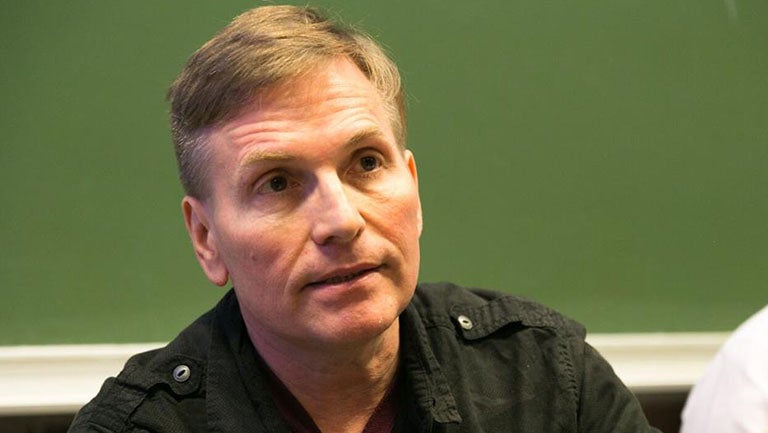Title: Georgetown Professor Questions Claims About Prehistory in New Book
Professor Karl Widerquist co-authors a book debunking the myth about prehistory that everyone is now better off because of the existence of government and property rights.

A new book about prehistory, co-authored by a professor at Georgetown University in Qatar (GU-Q), questions whether people are better off because of the existence of government and property rights.
Karl Widerquist and Grant S. McCall of Tulane University are the authors of Prehistoric Myths in Modern Political Philosophy (Edinburgh University Press, 2017).
Widerquist says the book shows how myths about the benefits of modern societies are passed on by philosophers and others without question or critique.
“It’s very easy to mistake a commonly held belief for a commonly known fact,” he explains. “If so many people say it, and so few contradict it, you might very reasonably assume someone must have verified it.”
The reality, he contends, is that people aren’t necessarily better off than they were thousands of years ago before written records were kept.
Modernity Falls Short
“We present evidence from historical, anthropological and archaeological sources to compare the lives of disadvantaged people in capitalist states with people in small-scale stateless societies in the present era as well as the distant past,” Widerquist explains. “Our research shows not only that the benefits of modern, capitalist states have failed to reach everyone, but also that these benefits have come at the expense of the least advantaged people today.”
He notes, for example, that there was no homelessness in prehistory, and that the diet of the average homeless person today is likely less healthy and less secure than if they had been born 20,000 years ago.
“This is the sad tragedy of our societies today,” Widerquist says. “It would be easy, cheap even, to make sure everyone really was better off in modern society. But we don’t bother.”
Alienation, Disease
He also notes that modern states have created new diseases, new forms of alienation and mental disorders seldom observed in stateless societies.
“Suicide is almost unheard of in the smallest-scale societies,” the professor says. “Freedom is greater in stateless societies. Capitalist states have provided more luxuries to almost everyone, but they have not given us more leisure or less work effort, and they have not done as good a job of providing for everyone’s basic needs.”
The book, the first in a two-part series, is the result of Widerquist’s long-held interest in the claims made about prehistoric societies.
“I have always been fascinated by the gap I see in our common knowledge of prehistory,” he explains. “You read a lot about the human evolutionary period, and you read a lot about the rise of early literate civilizations, but 200,000 years passed between the first appearance of fully human people and the rise of the first states.”
Stuff of Myth
Despite anthropologists having learned a great deal about prehistory, contemporary philosophers and social scientists still treat it as the stuff of myth, Widerquist says.
“I’ve always been unhappy with how ready so many people are to make pronouncements about life in this period, how little responsibility they feel to provide evidence for those pronouncements, and how ready they are to use those pronouncements to justify something in the present day,” he says. “This book is an attempt to correct the record.”
Widerquist, who teaches political philosophy at GU-Q, holds a doctorate in political theory from University of Oxford and a doctorate in economics from the City University of New York.
Prehistoric Myths in Modern Political Philosophy is the seventh book he has written or edited, with the majority of his previous research focusing on distributive justice.